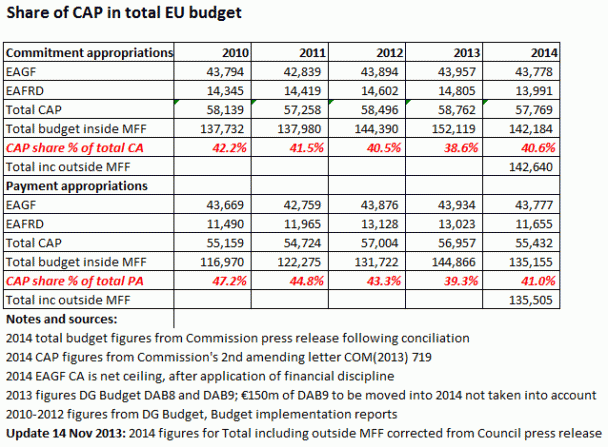My previous post on EU budget decision-making in mid-October described the complex inter-relationships between agreement on the EU’s long term budget the Multi-annual Financial Framework, the conciliation procedure with respect to the 2014 budget and the divisions between the Council and Parliament on the Commission’s draft amending budgets to the 2013 budget seeking additional funds to avoid pushing more expenditure further into the coming year.
At the end of the post, I described an optimistic scenario in which the Lithuanian Presidency got the Council’s agreement to pay the amending budgets for 2013 and the conciliation process between Council and Parliament on the 2014 budget was successful, thus paving the way for formal approval of the political agreement already reached on the MFF. In the end, it took a marathon session of the conciliation committee (comprising all 28 member state budget ministers and an equal number of parliamentarians) lasting 16 hours on Monday last 11 November to reach the necessary compromises on the 2013 and 2014 budgets. This means that the EU, subject to formal ratification by the two institutions, has now both its long-term budget in place and the budget for the coming financial year. (The Commission press statement is here, the Council statement here, and the Parliament statement here).
The Parliament’s budget committee will vote on the outcome of the conciliation procedure on the 2014 budget on Thursday. This will open the way for a packed November plenary session of the Parliament starting next Monday evening 18 November which will include a series of carefully-choreographed votes on both budget issues and the political agreement on CAP reform.
The CAP share of EU budget increases
One consequence of the budget bargaining is to reverse, at least temporarily, the long-run decline in the share of CAP expenditure in the EU budget. The Commission’s original draft budget foresaw a reduction in nominal spending in 2014 compared to 2013. In the negotiations, the Council sought to further reduce the Commission’s draft budget proposal, while the Parliament sought to defend it. The net result is a reduction of around 6% (in nominal terms) in the total budget in 2014 compared to 2013 whether measured in terms of commitment appropriations (CA) or payment appropriations (PA) (Update 14 Nov 2013: Note that the Council press release quotes a reduction of 9.5%/9.4% for CA/PA respectively, which appears to refer to total spending including spending outside the MFF, whereas the 6% reduction refers only to MFF spending).
CAP expenditure is actually reduced by less than this (by 2 or 3% whether measured in CA or PA terms), with the result that the share of the CAP in the total EU budget rises to 41%, whether measured in CA or PA terms. The CAP figures shown in the table for 2014 are those in the last Commission draft budget proposal. Agra Europe reports that rural development spending suffered a cut as compared to the Commission proposal in the conciliation procedure, but none of the publicly-available information at this point indicates what this might be. If a change was agreed in conciliation, then the table will be updated to reflect this.

Europe may be experiencing the worst economic crisis of the last half-century; the European Parliament may boast that it secured more funds for growth policies such as research, education and innovation. But the fact of the matter is that, despite the huffing and puffing by the Parliament, the EU budget will transfer an even larger share of its total resources to EU farmers next year than it does currently as a result of the budget deal reached this week. Even the much-watered-down greening measures cannot justify this as they do not come into force until 2015.
2 Replies to “CAP budget share rises as budget deadlock finally resolved”
Comments are closed.


very interesting article.
anyway we have also to consider that while cap expenditure even goes down (even if cap exp on total expenditure rate climb up) eu has become larger, phasing in of direct payments for newcomers countries need more money etc. etc. so probably cap expenditure per ha and per farmers has declined in 2014…
bye and regards
Vincenzo Lenucci
Rome – Italy
@ Vincenzo
Thank you for your comment, and the point you make is correct; in terms of payments per farm or per ha, there will be a reduction in real terms in 2014. My point is that the allocation of EU budget spending is usually taken as a reflection of EU political priorities, and in 2014 at least, the Parliament and Council have protected and prioritised transfers to farmers to a greater extent than other expenditure areas.